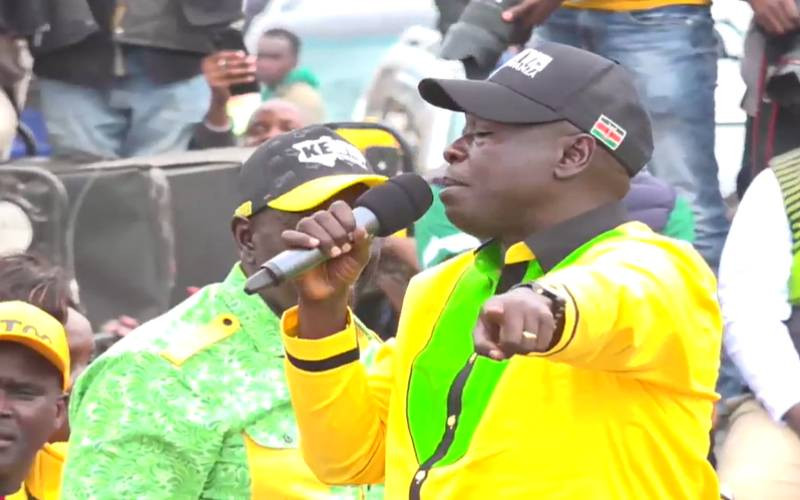
The United Democratic Alliance (UDARigathi )’s Gachagua has urged the government not to use chiefs in election campaigns.
On Saturday, July 23, the UDA deputy presidential candidate stated that President Uhuru Kenyatta was utilizing all available State machinery, including chiefs, to campaign for Azimio la Umoja-One Kenya presidential candidate Raila Odinga.
The Mathira Member of Parliament stated during presidential campaigns in Kitengela, Kajiado County, that chiefs’ key responsibilities include assisting Kenyans in replacing lost identity cards and tracing wives who have fled their matrimonial homes.
“Chiefs should not be used to direct Kenyans’ voting choices in elections.” Wewe chief, kwenda ambia bibi yako, kama unataka kuambia mtu pahali atapiga kura. Chief kazi yako ni kutengeneza mambo ya mpaka, kuandika barua ya kitambulisho na kama bibi ya mtu ametoroka, mtafutie huyo bibi umrudishie, mtafutie huyo bibi umrudishie Chief, si hiyo ndiyo kazi ya?
“If you are a chief, know that you have no right to tell anyone who to vote for in elections.” You can only influence your wife. As a chief, your responsibilities include resolving land boundary disputes, stamping letters for Kenyans who have misplaced their identity cards, and ensuring that a man whose wife has fled the matrimonial home is reunited with the spouse. Aren’t these the only responsibilities that a chief has?”
The UDA deputy presidential candidate also urged the government not to use the police to settle political scores, citing a Thursday incident in which a Venezuelan national was detained at the JKIA with IEBC stickers.
Gachagua claimed in his address at Kitengela that he is better suited to serve as Kenya’s second deputy president under the new Constitution, claiming that his ability was demonstrated during the deputy presidential debate on Tuesday, July 19.
“I debated against Martha Karua the other day.” Tulimnyorosha, hatukumnyorosha (Didn’t we triumph over her?)
“In the presidential debate on Tuesday (July 26), William Ruto will face Raila Odinga of Azimio la Umoja. Raila appears to have panicked. It is difficult to speak for 90 minutes while standing. The debate is looking for someone who is both mentally and physically fit. I’ve heard that the Azimio team wants Raila to have a seat during the debate. “I’m sure hustler (Ruto) will completely outshine him,” Gachagua predicted.
In the run-up to the deputy presidential debate on July 19, some social media users, particularly on Twitter, worried that Gachagua would say something inappropriate that would cost UDA votes.
The debate arose in response to remarks made by the Mathira Member of Parliament that irritated a segment of Kenyans.
For example, he previously stated that the blue police uniform was unattractive, and if he and Deputy President William Ruto win on August 9, they will “return the ugly blue uniform to members of the PCEA Woman’s Guild.”
Chiefs’ duties
Chiefs and assistant chiefs play an important role in dealing with basic case management issues at the grassroots, contrary to Gachagua’s Saturday remarks, which may have been made in jest.
Every chief or assistant chief’s primary responsibility is to keep the area in which he or she is appointed orderly.
According to the Chiefs’ Act, a chief or assistant chief has the authority to:
• Prohibit or restrict the consumption or possession of intoxicating liquor by minors, as well as the supply of such liquor to minors.
• Prohibit or limit the holding of drinking contests.
• Prohibit or restrict the cultivation of poisonous or noxious plants, as well as the production, distribution, sale, and possession of noxious drugs or poisons.
• Prohibit or limit the carrying of firearms.
• Prohibit any act or conduct that, in the chief’s opinion, could spark a riot, a disturbance, or a breach of the peace.
• Prevent water pollution in any stream, watercourse, or water-hole, as well as the obstruction of any stream or watercourse.
A chief or assistant chief may also arrest and turn over a suspected criminal to the police.
Part One, Section Eight, Sub-Section One of the Chiefs’ Act states, “Any chief or assistant chief may interpose for the purpose of preventing, and shall to the best of his ability prevent, the commission of any offence by any person within the local limits of his jurisdiction.”


